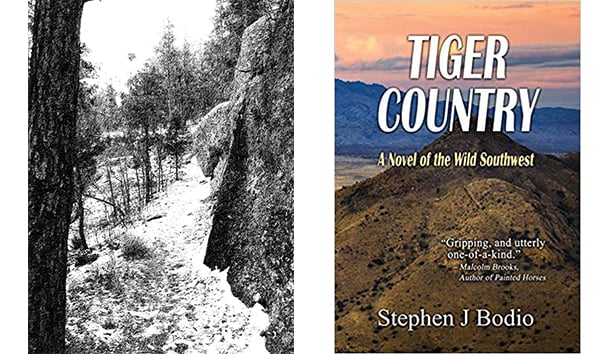Stephen Bodio is a memoirist, journalist, critic, sportswriter, naturalist, outdoorsman, hunter, falconer, bird breeder, dog breeder, and now a novelist. Born in Boston, he has lived in the dusty roadside hamlet of Magdalena in southwestern New Mexico for more than 30 years and has published a dozen books, including the superb Querencia—the literary artist’s autobiographical equivalent of Erich Segal’s Love Story of 1970.
Tiger Country, his first novel, is in a sense Bodio’s equivalent of Edward Abbey’s The Monkey Wrench Gang, about a group of militant environmentalists who, having sworn themselves to a policy of nonviolence against human beings, set out to blow the Glenn Canyon Dam in northern Arizona to free the waters of Lake Powell, impounded since 1966, and return the magnificent slickrock canyons upstream in Utah to their original pristine condition ante diluvium. Better written and lacking the occasional cartoonish aspects of Abbey’s highly entertaining story, Tiger Country concerns a foursome of environmentally and romantically minded friends who work together to protect one of their number, a rancher from old-line New Mexican stock who has conceived a plan to reintroduce wolves, grizzly bears, and jaguars to the Gila country by conspiring with a pair of unscrupulous poachers operating in the country of the Yellowstone a thousand miles north, and in Old Mexico. Bodio captures the beauty of this wildest portion of New Mexico, the Gila, fully and precisely, in the glowing prose for which he is famous. No living author in America writes better, including Cormac McCarthy (though McCarthy’s style is sufficiently different from Bodio’s as to make further comparison between them implausible).
Steve Bodio’s narrative abilities translate beautifully from nonfiction to fiction. In both genres, he displays a superb sense of pace and of timing, being adept at releasing information the reader feels the need to have precisely at that moment when withholding it further would result in a lapse of interest. His grasp of character is always secure, and his ear for contemporary Southwestern speech pitch-perfect. While the story is a relatively straightforward one, the emotional situation generated among the principal characters, two men and two women, is not simple at all. At first adventurous companions, they grow increasingly close in ways that ordinarily produce jealousies and rivalries; astonishingly, the opposite happens as four people form a community of a type found (one supposes) in the earliest and most primitive human societies where everything, including sexual possession, is held in common. That, at least, seems to be what Bodio is suggesting in the novel’s final scene, directly following a gory horrific conflict between two men and a protective grizzly sow, in a cave far up a snowy canyon in the Gila Wilderness.
Bodio’s sense of place—his literary proprietorship of New Mexico should be as indisputable as William Faulkner’s of Mississippi—and his descriptive powers are unsurpassable.
At four o’clock . . . he had noticed the light change. It was as though the color values had turned dramatically, although the sun still lit the tress. Then, suddenly, they went into blue shadow as a twirl of breeze set the dust to eddying around the yard. A strong smell of pine reached his nostrils at the same time. . . .
To the west was a wall of bruise-colored sky that towered above the mountains until its top wall was edged with light. Subtle breezes were now sucking towards it, to the west . . . Thunder rumbled and he could see ropes of backlit rain hanging from the advancing monster, with the texture of watercolor on wet paper. In places the whole scene blurred with white mist. He ran back into the house and through its four little odd-shaped rooms slamming windows. . . .
Lightning flashed, and the first near burst of thunder shook the house. . . . Instantly the air outside was full of hail, roaring down, clattering on the steep-pitched corrugated tin roof like an avalanche of pebbles, whitening the ground more suddenly than any snow. The pea-sized stones rebounded two feet into the air. The ground was covered with a fine mist of fractured hail and hissing water, like cold steam.
For five minutes the whole world shook; then the monster began to pass to the east, toward town, trailing gusts of rain. Windrows of hail, like textured snowdrifts, and muddy puddles covered ground that was bare dust ten minutes before. The whole world smelled of pine and resinous plant vapor. And all the low trees lit up with a golden light from the west, glowing like green flames against the blue-black and white backdrop of the moving storm.
This is nothing less than the translation of Beethoven’s scores of the last two movements of the Pastoral Symphony into literature.
Some people, reading an evocative description of a gourmet meal in a Paris restaurant, or a deliciously rustic one in a Sicilian taverna, feel the irresistible urge to eat. In my case, reading prose like Steve Bodio’s inspires me with the unconquerable desire to write.
[Tiger Country: A Novel of the Wild Southwest, by Stephen J. Bodio (Tyrone, PA: Behind the Ranges Press) 195 pp., $14.99]

Leave a Reply